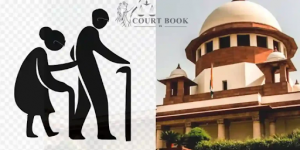In a significant ruling that reshapes the landscape of Mumbai’s redevelopment disputes, the Bombay High Court has clarified that flat purchasers who buy units through a developer lose all rights in a housing society’s redevelopment project once that developer’s contract is terminated.
Justice Kamal Khata, while dismissing a petition filed by a Kurla-based couple, reaffirmed that such third-party buyers cannot stake ownership claims, demand possession, or obstruct ongoing redevelopment after the termination of the original developer. Their only recourse lies in seeking compensation from the ousted developer, not from the society or the new builder.
Also Read: Supreme Court Orders Son to Vacate Properties, Upholds Rights of 80-Year-Old Father
What Was the Case About?
The petition was filed by Satish and Swapna Inamdar, who had booked flats through M/s Adit Enterprises — the original developer engaged by the Nehru Nagar Vidyut Vilas Co-operative Housing Society for its redevelopment project.
However, after disputes arose, the society terminated its agreement with Adit Enterprises in 2015, a decision later upheld through arbitration. Following this, the couple approached the court seeking to restrain the society from carrying out demolition, altering plans, or selling flats in the redeveloped building, arguing that their booking rights should still be honored.
The Petitioners’ Argument
The Inamdars contended that since the housing society is the owner of the land, it should be deemed a promoter under the Maharashtra Ownership Flats Act (MOFA), and thus, legally bound to fulfill the commitments made to flat purchasers by the developer.
They also argued that terminating the developer’s contract should not nullify their booking rights, especially when payments had been made in good faith.
What the High Court Said
Justice Khata, however, disagreed with this reasoning, relying heavily on precedents, including the recent Tuvin Constructions judgment. The court reiterated that a co-operative housing society and a newly appointed developer cannot be held liable as co-promoters for the commitments made by a previously terminated developer.
Quoting from the judgment, Justice Khata observed:
“The consistent view of this court is that purchasers claiming through a terminated developer cannot assert or enforce any rights against the society or the newly appointed developer. Their remedies, if any, are confined to claims against the erstwhile developer.”
This means that once a society ends its agreement with a builder, the contractual relationship between flat buyers and the society ceases to exist, leaving the buyers to pursue damages only from the previous developer.
Also Read: Chhattisgarh HC Rules: Daughters Cannot Claim Property Share if Father Died Before 1956
Court’s Final Decision
After reviewing the facts, the Bombay High Court upheld the Bombay City Civil Court’s earlier decision, which had refused to grant any interim relief to the petitioners. Consequently, the court dismissed the couple’s plea, marking yet another instance of the judiciary favoring societies’ autonomy in redevelopment matters over third-party booking claims.
Why This Judgment Matters
This ruling carries weight for thousands of homebuyers and redevelopment projects across Mumbai and Maharashtra. It reinforces a critical legal principle — purchasers who buy flats from a developer without verifying the stability of the developer’s contract with the society risk losing their rights if that developer is removed.
The judgment also emphasizes the importance of due diligence before investing in under-construction or redevelopment properties, particularly verifying whether:
- The developer’s agreement with the housing society is valid and active.
- The project has obtained all necessary approvals.
- Payments are made only after cross-verification with the society’s managing committee.
Legal experts note that this decision will likely discourage speculative flat bookings in redevelopment projects and ensure greater transparency in housing transactions.
In Summary
- Case: Satish & Swapna Inamdar vs. Nehru Nagar Vidyut Vilas CHS
- Developer: M/s Adit Enterprises
- Key Ruling: Buyers through a terminated developer cannot claim ownership or possession in redevelopment.
- Remedy: Such buyers can only claim damages from the ousted developer, not from the society or new builder.
Conclusion
The Bombay High Court’s ruling is a clear message to homebuyers — always verify the developer’s contractual status with the housing society before booking a flat. Once that contract is terminated, your rights don’t extend to the project, no matter how genuine your purchase may be.
This judgment not only upholds the rights of co-operative societies but also underscores the need for stronger awareness and caution among flat purchasers navigating Mumbai’s complex redevelopment ecosystem.
In a significant ruling that reshapes the landscape of Mumbai’s redevelopment disputes, the Bombay High Court has clarified that flat purchasers who buy units through a developer lose all rights in a housing society’s redevelopment project once that developer’s contract is terminated.
Justice Kamal Khata, while dismissing a petition filed by a Kurla-based couple, reaffirmed that such third-party buyers cannot stake ownership claims, demand possession, or obstruct ongoing redevelopment after the termination of the original developer. Their only recourse lies in seeking compensation from the ousted developer, not from the society or the new builder.
Also Read: Supreme Court Orders Son to Vacate Properties, Upholds Rights of 80-Year-Old Father
What Was the Case About?
The petition was filed by Satish and Swapna Inamdar, who had booked flats through M/s Adit Enterprises — the original developer engaged by the Nehru Nagar Vidyut Vilas Co-operative Housing Society for its redevelopment project.
However, after disputes arose, the society terminated its agreement with Adit Enterprises in 2015, a decision later upheld through arbitration. Following this, the couple approached the court seeking to restrain the society from carrying out demolition, altering plans, or selling flats in the redeveloped building, arguing that their booking rights should still be honored.
The Petitioners’ Argument
The Inamdars contended that since the housing society is the owner of the land, it should be deemed a promoter under the Maharashtra Ownership Flats Act (MOFA), and thus, legally bound to fulfill the commitments made to flat purchasers by the developer.
They also argued that terminating the developer’s contract should not nullify their booking rights, especially when payments had been made in good faith.
What the High Court Said
Justice Khata, however, disagreed with this reasoning, relying heavily on precedents, including the recent Tuvin Constructions judgment. The court reiterated that a co-operative housing society and a newly appointed developer cannot be held liable as co-promoters for the commitments made by a previously terminated developer.
Quoting from the judgment, Justice Khata observed:
“The consistent view of this court is that purchasers claiming through a terminated developer cannot assert or enforce any rights against the society or the newly appointed developer. Their remedies, if any, are confined to claims against the erstwhile developer.”
This means that once a society ends its agreement with a builder, the contractual relationship between flat buyers and the society ceases to exist, leaving the buyers to pursue damages only from the previous developer.
Also Read: Chhattisgarh HC Rules: Daughters Cannot Claim Property Share if Father Died Before 1956
Court’s Final Decision
After reviewing the facts, the Bombay High Court upheld the Bombay City Civil Court’s earlier decision, which had refused to grant any interim relief to the petitioners. Consequently, the court dismissed the couple’s plea, marking yet another instance of the judiciary favoring societies’ autonomy in redevelopment matters over third-party booking claims.
Why This Judgment Matters
This ruling carries weight for thousands of homebuyers and redevelopment projects across Mumbai and Maharashtra. It reinforces a critical legal principle — purchasers who buy flats from a developer without verifying the stability of the developer’s contract with the society risk losing their rights if that developer is removed.
The judgment also emphasizes the importance of due diligence before investing in under-construction or redevelopment properties, particularly verifying whether:
- The developer’s agreement with the housing society is valid and active.
- The project has obtained all necessary approvals.
- Payments are made only after cross-verification with the society’s managing committee.
Legal experts note that this decision will likely discourage speculative flat bookings in redevelopment projects and ensure greater transparency in housing transactions.
In Summary
- Case: Satish & Swapna Inamdar vs. Nehru Nagar Vidyut Vilas CHS
- Developer: M/s Adit Enterprises
- Key Ruling: Buyers through a terminated developer cannot claim ownership or possession in redevelopment.
- Remedy: Such buyers can only claim damages from the ousted developer, not from the society or new builder.
Conclusion
The Bombay High Court’s ruling is a clear message to homebuyers — always verify the developer’s contractual status with the housing society before booking a flat. Once that contract is terminated, your rights don’t extend to the project, no matter how genuine your purchase may be.
This judgment not only upholds the rights of co-operative societies but also underscores the need for stronger awareness and caution among flat purchasers navigating Mumbai’s complex redevelopment ecosystem.







